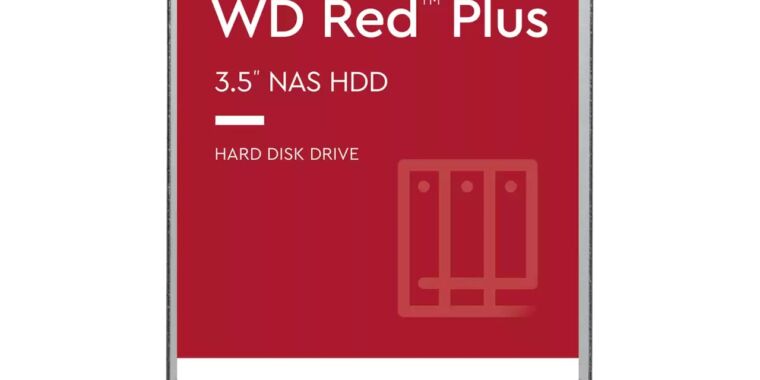If WD expects its drives to fail after 3 years, then WD is manufacturing shoddy products and it’s time to change vendors.
Which is a real shame, because WD was until recently the gold standard of disk drive reliability. To my recollection, I’ve never seen a WD drive fail.
I’ve got a machine whose (Seagate, not WD) drives have been powered on for 14 years and they still aren’t complaining. They’re about to, though—their SMART reports only 1% service life left!
Everyone has at least one bad story about a brand, and that experience can colour a consumer’s view indefinitely. I had a faulty WD drive in the computer I got to start college in 1997 but didn’t realize it, instead learning to reinstall Windows every six weeks. I rarely chose WD thereafter.
Everyone has a bad story about a brand for sure, not every brand takes a NAS quality, NAS branded drive they charge a premium for because it’s suitable for NAS and switches the underlying tech to something that’s fundamentally unsuitable for NAS applications. Then lies about it. Fuck WD.
Are you sure it was a faulty drive? I had a similar experience where it got to having to reinstall windows every week, but switching to Linux fixed it.
Best I can tell it was a mandatory windows update clashing with some of the hardware I had.
I didn’t know what a faulty hard drive sounded like at that time. Sticks with you. But I was playing around with NT5 betas anyway, so it turned out not to be a huge deal.
Which is a real shame, because WD was until recently the gold standard of disk drive reliability. To my recollection, I’ve never seen a WD drive fail.
Oh boy, I’ve had about 10 drive failures out of like 46 drives, all WD. I’ve had 3 WD Red Pro 6TBs fail and 7 WD Red 6TBs fail. This has been over around 7 or so years, although one of the WD Red Pro 6TB drives was bought this year and failed within 2 weeks (over 1000 bad sectors, it had the worst SMART stats I’d ever seen).
The WD Red 6TBs are particularly bad, I’ve had better luck with the WD Red Pro 6TBs, and then IIRC the WD Red 3TBs are like by far the worst out of WD’s Reds.
Not to mention, WD already tried pulling a fast one on customers when they swapped out WD Red drives with SMR drives then had to make a WD Red Plus for their (existing) CMR Red drives. I had a WD Red 6TB drive go bad, replaced it with a brand new WD Red Plus 6TB which immediately went bad, then replaced it with a WD Red Pro 6TB which also went bad within a few days. I replaced that one once again with a brand new WD Red Pro 6TB (I love brick and mortar PC stores, I got an awesome PC store near me) and that drive has been perfectly fine for a few months. My original WD Red 6TB drive in question did last me like, 6 or 7 years, I just got really unlucky with two quick failures in a row but all is good now.
I’ve not had a great experience with WD, but I’ve still heard worse things about Seagate so I am sticking with my WD Red Pro 6TBs for now.
I have a 13 year old 1tb WD mypassport that I loaded up with pirated movies and took with me to Afghanistan. It’s been through a lot, and it’s still working well today, not even a blip of an issue. Such a shame when companies drop off in quality.
This desktop right here (running a couple of ZFS pools) has drives with more than 3 years on it…
$ for d in $(find /dev/sd[a-z]); do sudo smartctl --all --json $d| jq -c '[.model_name,(.power_on_time?.hours?/8760)]' ; done ["CT1000MX500SSD1",2.2034246575342467] ["WDC WD140EDGZ-11B1PA0",0.3791095890410959] ["TOSHIBA HDWE140",4.040639269406393] ["TOSHIBA HDWE140",5.925684931506849] ["WDC WD80EMAZ-00WJTA0",3.359246575342466] ["TOSHIBA HDWE140",5.925684931506849]runs like a top (better not jinx myself).
Yep, it’s basically the best environment for them. Presumably relatively few writes compared to the uptime, in a case with few vibrations (!), very few power cycles (!!!). Basically all it does is spin on a highly precise bearing.
Anyway drive lisepans only matter for cost projections, when it comes to data integrity you should ALWAYS assume that a drive ia about to fail. Because sometimes it fails after 2 years and sometimes it runs for 20, that’s just the luck of the draw.
https://en.m.wikipedia.org/wiki/Planned_obsolescence
Profit making as intended
deleted by creator
I was sad to learn, that companies will to whatever makes them money within the confines of how strongly they’re being watched.
Companies only care about sustainability, as soon as the customers care about it. However, if the customers only care about superficial sustainability, then that’s what they’ll get…
deleted by creator
That might backfire on WD. I wonder if people will be posting pics of successive warnings like a trophy. Like sometime posting screenshots of router uptimes.
When I see long uptimes, my first and pretty much only thought is of unpatched vulnerabilities.
Eh, depends on the purpose of the device and what it’s running. Many Linux/Unix kernels don’t need reboot to restart services after updates.
They do have to reboot to apply kernel updates, and kernels have their share of vulnerabilities.
It’s entirely possible to update the kernel without rebooting.
Lol, I kinda hope so. I wanna see some of the uptimes people have accumulated! I’ve seen as high as around 100k POH on an old Barracuda.
I hope WD reverses this decision. There’s no reason to replace a drive after 3 years if there’s no issues.
Ah yes…the ever popular trend of chasing positive financial results, no matter how temporary, at the cost of everything else even if ‘everything’ includes negative financial results in the long term. Brilliant!
Further, you can’t repair a pool with a drive marked with a warning label.
“Only drives with a healthy status can be used to repair or expand a storage pool,” Synology’s spokesperson said. “Users will need to first suppress the warning or disable WDDA to continue.”
That sounds pretty terrible. I’ve had great luck with seagate and I think I even have a seagate drive. My Drives are all 6+ years old, except for 2 which are a bit newer and I have some drives I bough second hand super cheap. They may be 2 ish years old as well.
The HDD cartel can only be stopped with an international crackdown, with raids and laws. They constantly do shady stuff as the coordinated SMR scam.
I think the warning itself is not inherently bad, but the “please consider replacing the drive soon” portion is definitely unacceptable. I work in the disc drive industry and 3 years is very little, especially for a NAS drive. I’ve personally seen and used a number of drives with >100k POH.
I long while back (~15 years) there was a bit of a fiasco with Seagate drives. It had to do with firmware bricking some drives if I’m not mistaken. I was affect by this and didn’t have redundancy back then. I swore Seagate off from then on.
Recently WD had the SMR situation where they had to come clean about it and now this.
I feel like no mater who you go with, they try to screw you either way. That or maybe just go with Toshiba. Haven’t tried those yet. I’m not running a Synology anymore so that messaging won’t affect me, but it’s still annoying to know that it’s part of their business practices.
Ah yes, the Barracuda 7200.11 bugs. I wasn’t impacted by those but maybe it would’ve been better if I did - it might’ve kept me from buying a couple of those infamously bad 3TB drives they released a few years later.
edit: also, FWIW, Toshiba is in the midst of spinning off a number of their divisions - including the one that’s responsible for manufacturing HDDs so it might be the case that their old HDD division ends up being bought by Seagate or WD - much like what happened to HGST.
Wow. My homeserver drives generally last me 5-8 years before I replace them. Can’t imagine getting nag dialogs after 3…
With mirrored storage spaces / raid10, who really cares if a single drive dies?
I mean at that point, buying WD is asking to be shit on. Member that CMR/SMR fiasco some years ago? Yeah you shoulda boycotted em at that point
Bad faith warnings coming from selfish motives to deceive your customers into wasting money and causing more waste.
My WD RED NAS drives came with a 5 year warranty… My last synology NAS has had 5x 3TB drives powered on since 2013 - they have only been powered down to move house 5 times over that period.
every time i think i might go back to western digital i read something ridiculous like this. I’m so glad crucial, sabrent, et al are about to end the platter drive market in the next decade.
Wonder if WD or Segate are ready to license microsoft’s 3d optical storage.
Unpopular opinion, but I really see no problem with this? They aren’t reducing the capabilities of the drive or anything. Three years is a damn good time to have a plan. Whether it be validating your backups, having a hot spare on standby, or double checking your RAID status.
More importantly, for the average consumer who doesn’t maintain off site backups and may not have their NAS configured correctly to prevent data loss, giving people a head’s up that they are hitting the warranty limit isn’t a bad idea.
It’s been a long time since I had a drive fail in just three years, but that’s still all I consider a guarantee.
I could be wrong, but my understanding from Backblaze data/articles is that if your HDD made it past 1 year, it’s probably going to last at least a decade. Drives tend to fail early if they’re going to fail.
A warranty warning is fine, though still more obtrusive than I want personally. I haven’t lost a disc at all yet tbh, including well over a decade of pretty hard use one several. I’ve got local parity and cloud backups for when that inevitably changes though.
My point is less of what is possible, and more of what you should be prepared for. Yeah, the above saying to buy a new one is probably excessive, but from a liability standpoint, now they can say they warned you.
My last drive to fail was 5 years old, and I retired a matching drive last year at 9 years old on a suspicion it was exacerbating issues, but it still worked with passing SMART tests. They definitely can go for much longer.
My NAS drives are 2 years and six months old and I bought an identical model drive and installed it as a hot swap last month. I have both a RAID-5 equivalent setup and local and remote backups, but I’ve generally started a rotation or prepared newer drives around the 3 year mark for most of my career.
Warning the warranty will run out does no good for helping consumers avoid data loss.
Ask yourself who’s really benefiting here by telling people to throw a perfectly good hard drive in the landfill and buy a new one…













